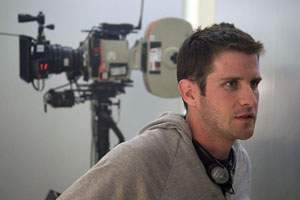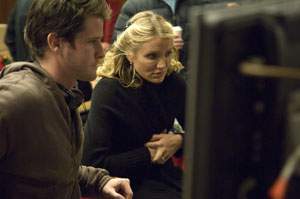
I decided to try to adapt someone else's story for a change simply because I'd had an obsession with this story since childhood. It's only about ten pages long and it felt to me like a wonderful first act for a film, and it was something I felt like I could bring a lot of ideas into the equation and incorporate a lot of autobiographical elements and make it this sort of personal, vintage science fiction film. It's a sort of homage to the kind of science fiction that Richard Matheson created in the '60s. I'm legally not allowed to mention a certain television programme. Now the movie's come out the might not be as hard core about it, but if they see me mentioning that show in print in interviews, I might get some angry calls from attorneys.
That's wild
I can't control it unfortunately
There is very clearly a homage to that era in the way the film is shot, and also the style of acting.
Absolutely.
After the success of DONNIE DARKO did you find there were unrealistic expectations put on you in regard to your follow-up films?
Perhaps. It's funny, because when DONNIE DARKO first came out in the US and we premiered it at Sundance, everyone said it was unreleasable, it was an incoherent mess. For a couple of years after Sundance the film barely got released and almost went straight to cable. Sometimes there's a delay for people to process things. Over the years DARKO has built this big cult following and if anything I've just tried to continue to push myself in new directions. I might not ever make another film as popular as Donnie Darko, but I'm going to keep trying as long as they let me.
Do you find it frustrating that there isn't a market out there for intelligent sci-fi, such as SOUTHLAND TALES, but you get all these popcorn sci-fi films, like AVATAR, that sell millions of tickets and yet there is this solid core of intelligent sci-fi films that no-one want to go and see?
Yeah, it is frustrating because Matheson was one of the godfathers of science fiction, and writers like Philip K Dick who have had plenty of popular films made from his works – some successful and some not so successful. I find the more cerebral science fiction to be the most interesting and most literate, and there is so much great science fiction literature out there, and it's always my hope that the more cerebral science fiction films will find audiences. THE BOX was intended to be a celebration of that vintage science fiction. There's a scene in the film where the babysitter is thumbing through those old, serialised comic books from the '50s called Astounding Science Fiction, and the film was meant to be something that could have emerged from one of those books. It is frustrating, but I also think that in a lot of ways THE BOX is kind of an art film, or a niche audience, science fiction film, but I'm always hoping that pushes more into the mainstream because I think there are so many ideas that can be explored in science fiction stories that can make things a lot more interesting.

We have Comicon here in the US. Does the UK have its own Comicon type event?
There are big conventions but they are more like big shopping centres that sell books and toys and autographs, but SCI-FI-LONDON is the only event that specialises in showing independent sci-fi films.
That's great. As the Internet sort of disseminates information globally, it's my hope that science fiction will continue to be appreciated, particularly as literature and true art. People tend to be dismissive of science fiction writers as though they are not literature and not on the same level as people who write about reality.
When, in fact, science fiction covers more ideas and concepts of what is going on in the world around us than most stories based in "reality".
There's one question that had me puzzled towards the end, when the character gets shot, which happens at the same time as the button on the box is pushed, if she hadn't pressed the button, would the person have died?
That is the eternal question. I liken that question to, "if a tree falls in the woods does it make a sound?"; or the chicken or the egg question. There's a really interesting debate about this button does not appear to have any technology associated with it, but as the movie progresses we see there is some sort of otherwordly magic technology in that liquid substance, there is clearly some sort of major, beyond or comprehension technology at work, so the button unit is actually a trick. It appears to be this meaningless device but perhaps it does have massive consequences when the button is pushed. There is a system of control, or a network of, in the fact that Norma and Arthur have been baptised in this fluid, are they now, somehow, under the control of this device. It gets into the ideas of predestination, and a lot of the ideas I explored in DONNIE DARKO, such as the liquid entities that come out of people's chests; are we in control of our own destiny, or is it higher intelligence? It is an interesting conundrum at the end, and in the editing we wanted to align it perfectly with when the button is pushed and the gun goes off to really drive it home. That's one of the messages of the film, which is something Ray Bradbury and a lot of other writers have talked about; one tiny, instantaneous decision made by one person can have a ripple effect throughout the whole world.
The butterfly effect…
It's the idea that these test subjects, these people that are chosen by the higher intelligence, who are very moral, upstanding, decent people, their decisions have these great ramifications. There's even a character in the script that says, "Whatever happens next Arthur will have greater ramifications than you can possibly fathom." His decision to pull that trigger at the end is a huge, huge deal. My hope is the audience will have an ethical debate about whether Arthur made the right decision to pull that trigger at the end. Is that the thing to do? Is that the most moral or altruistic thing to do, not only for his family and his child, but for the rest of the world? What are the consequences for the rest of the world? You see throughout the rest of the film you get a glimpse of the Twin Towers, a glimpse of the Pentagon and a glimpse of all sorts of stuff happening inside Arlington Steward's plans. He obviously has plans to do many more experiments while he's here and it's only the beginning of them. If anything, it's intended to illustrate a relationship between mankind and a higher power. In the cycle of our time on the planet how do we rate on a scale of zero to a hundred in our altruism?
Steward actually says that if the people chose between doing the right thing and material gain humanity would be saved, which is what made me ask the question. If the other person hadn't pushed the button would the trigger not been pulled and the chain broken?
I think it is an experiment taking place over many years with many couples to study and analyse the data from the tiniest of emotional responses to the events that happened to the married couples. Are they looking at us like lab rats, or are they trying to assess, ultimately, how decent are we as a species? We are still capable of making mistakes and being tricked into pushing the button on this device. Should we be forgiven for that? Can we still save ourselves? Can we still redeem ourselves? I'm also trying to paint a portrait of the higher intelligence at the end of this film as being capable of forgiveness. Arlington does actually like Arthur and Norma and grows very fond of them. The film probably has a happier ending than maybe some people realise.
And it leaves it open to a lot of debate, which is what a good science fiction film should do, rather than walking out of the cinema going, "The special effects and 3D were amazing".
Exactly.
THE BOX is out now on DVD and Blu-ray and available from Play and all good retailers.